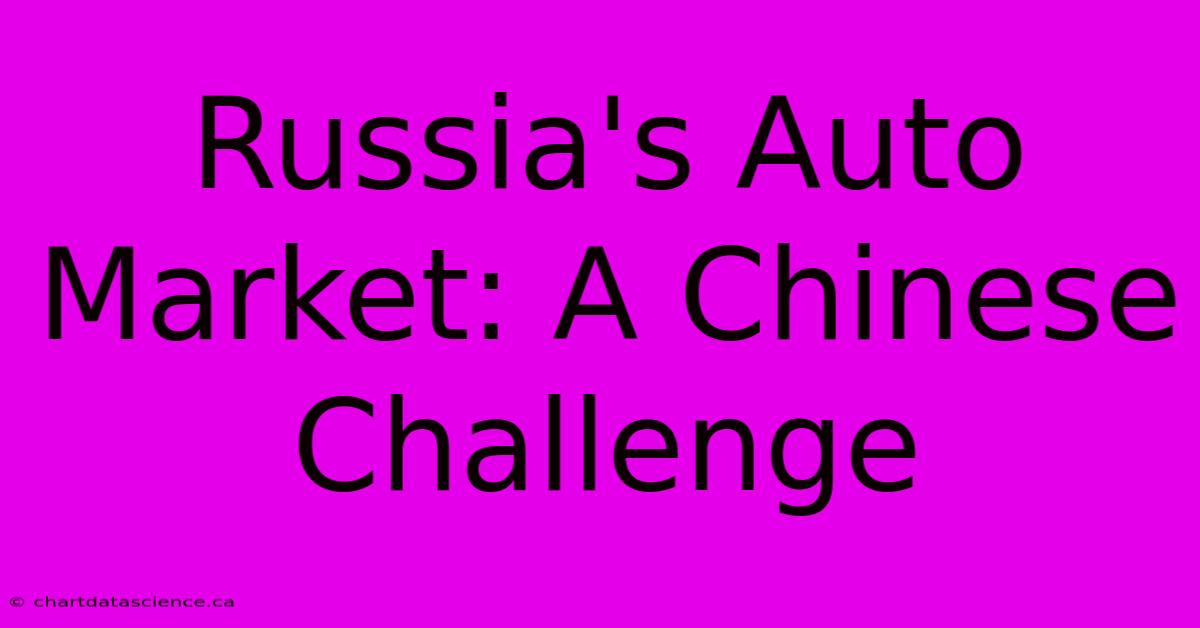Russia's Auto Market: A Chinese Challenge

Discover more detailed and exciting information on our website. Click the link below to start your adventure: Visit My Website. Don't miss out!
Table of Contents
Russia's Auto Market: A Chinese Challenge
Russia's automotive market, once dominated by European and domestic brands, is undergoing a dramatic shift. The ongoing geopolitical landscape and economic sanctions have created a vacuum, one that Chinese automakers are rapidly filling. This article explores the rise of Chinese car brands in Russia, the challenges they face, and the implications for the future of the Russian auto industry.
The Decline of Traditional Players
Before the dramatic changes of recent years, the Russian auto market was a relatively stable ecosystem. European brands, particularly those from Germany, held significant market share. Domestic manufacturers, like AvtoVAZ (Lada), also played a crucial role. However, the imposition of sanctions following the 2022 invasion of Ukraine drastically altered the market dynamics. Many European manufacturers ceased operations in Russia, leaving a gaping hole in supply and consumer choice. This created an opportunity for new entrants – primarily Chinese brands.
Sanctions and Supply Chain Disruptions
The impact of sanctions extended beyond the withdrawal of major players. Supply chain disruptions hampered the production and availability of vehicles from remaining brands. Parts shortages and logistical difficulties significantly reduced the number of cars available to Russian consumers. This scarcity heightened the appeal of Chinese brands, which, while not immune to supply chain issues, proved to be more adaptable and readily available.
The Chinese Automotive Onslaught
Chinese automakers have aggressively targeted the Russian market, offering competitive pricing and a range of models tailored to Russian preferences. Their success isn't merely due to circumstance; it's a result of strategic planning and adaptation.
Competitive Pricing and Attractive Features
Chinese manufacturers have leveraged their cost advantages to offer vehicles at significantly lower prices compared to their European counterparts. This affordability is a critical factor in a market sensitive to economic fluctuations. Furthermore, many Chinese models offer feature-rich packages, including advanced technology and safety features, further bolstering their appeal.
Adapting to the Russian Market
Simply offering low prices isn't enough. Chinese automakers have demonstrated a keen understanding of the Russian consumer. They've adapted their marketing strategies and vehicle designs to appeal to local tastes, proving their commitment to the Russian market. This localized approach is a key differentiator from previous attempts by foreign manufacturers.
Challenges for Chinese Brands in Russia
Despite their rapid expansion, Chinese automakers aren't without their challenges in the Russian market.
Brand Perception and Trust
Overcoming ingrained perceptions and establishing brand trust is a significant hurdle. While price and features are compelling, some Russian consumers remain hesitant to embrace relatively unknown Chinese brands. This requires sustained marketing efforts to build brand awareness and credibility.
After-Sales Service and Infrastructure
A robust after-sales service network is crucial for success. Building and maintaining an extensive network of dealerships and service centers across Russia’s vast geography presents a logistical challenge. Providing reliable and timely service will be key to ensuring customer satisfaction and building lasting brand loyalty.
Geopolitical Uncertainty
The ongoing geopolitical situation adds an element of unpredictability to the market. Future sanctions or shifts in the political climate could impact the operations of Chinese automakers in Russia. Navigating this uncertain environment requires flexibility and adaptability.
The Future of the Russian Auto Market
The Russian automotive landscape is evolving rapidly. The dominance of Chinese brands is not guaranteed, but their current trajectory is undeniable. The success of these brands will depend on their ability to address the challenges outlined above while continuing to provide competitive products. The future will likely see a more diverse market, with a stronger presence of Chinese brands alongside remaining domestic and potentially returning international players. However, the Chinese automotive challenge has fundamentally reshaped the Russian auto industry, making it a compelling case study in global market dynamics.

Thank you for visiting our website wich cover about Russia's Auto Market: A Chinese Challenge. We hope the information provided has been useful to you. Feel free to contact us if you have any questions or need further assistance. See you next time and dont miss to bookmark.
Also read the following articles
| Article Title | Date |
|---|---|
| One Hundred Years Of Solitude A Netflix Series | Dec 13, 2024 |
| Minister Allows Candace Owens Entry | Dec 13, 2024 |
| Badenoch On Nigeria Pr A Clear Denial | Dec 13, 2024 |
| Fai Decides Against Gleeson Contract | Dec 13, 2024 |
| Live Dortmund Barcelona Champions League Match | Dec 13, 2024 |
